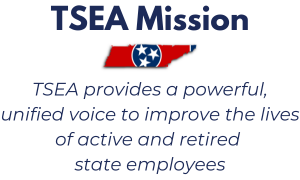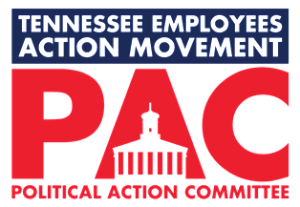It was a busy week for TSEA and state employees. On Monday, Governor Bill Lee gave his first state of the state address outlining the priorities of his proposed state budget. Here are a few selected highlights we pulled from the Governor’s budget document:
Higher Education
A general fund recurring recommendation of $56 million funds increased operational costs in the University of Tennessee system ($16.5 million), Locally Governed Institutions ($21.8 million), and the Board of Regents ($17.8 million). These funds may be used for salary increases as well as program improvements that assist the institutions in meeting outcomes such as student progression, degree production, research and service, efficiency metrics, and other outcome measures related to institutional mission. A 2.0 percent salary pool for employees working in non-formula units of higher education is funded with $8.5 million.
Health and Mental Health Services for Under-Served Populations
The state’s behavioral health safety net is expanded with $5 million recurring funding in the Department of Mental Health and Substance Abuse Services that will provide services to an additional 7,000 uninsured adults with a serious mental illness. Increased operational costs at the state’s four regional mental health institutes are funded with $6.2 million recurring.
New Investments in Criminal Justice Reform
A recurring appropriation of $15.6 million is recommended in the Department of Correction to increase the starting salaries of correctional officers. The salary increase is aimed at reducing the extremely high turnover rate of these positions. An additional 40 probation and parole officers and managers in Correction are funded with a recurring appropriation of $2,170,500 and nonrecurring of $250,000. These new positions reduce current caseload levels and bring supervision standards in-line with industry best practices.
Pay for Performance and Employee Benefits
To continue implementing Pay for Performance in executive branch agencies, an appropriation of $14.4 million is recommended. This amount is the equivalent of a 2 percent across-the-board increase; however, the percentage increase each employee receives will be based on an evaluation score of valued, advanced, or outstanding. Employee evaluations will be completed on September 30, 2019, and the resulting salary increases will be effective on January 1, 2020. Recurring funding for salary market adjustments is recommended at $18.5 million.
Salary increases for state employees not covered by the TEAM Act will be funded with an appropriation of $6.7 million, which is the equivalent of a 2 percent across-the-board increase. The amount of increase each employee receives will be decided by the appointing authorities of those agencies and those increases will be effective July 1, 2019.
Changes to state employee benefits including retirement and other post-employment benefit (OPEB) liabilities are funded with a recommendation of $20 million recurring for retirement and $12 million recurring for OPEB.
We are still learning more details about the Governor’s proposed budget. Keep in mind, the budget must now travel through the legislative process, where there are likely to be changes. As we learn more details, and if changes are made which impact state employees, we will share them with you.
TSEA this week also had the following three bills up in various committees. (Each bill passed on to the next committee):
Longevity for All
SB0689 Sen. Jackson
HB0900 Rep. Sparks
Status:
Senate: 02/07/19 – Referred to Senate State & Local Government Committee.
House: Set for House State Committee 03/12/19.
Burden of Proof
SB0621 Sen. Hensley, Co-Prime Sponsor: Sen. Yager
HB0644 Rep. T. Hill
Status:
Senate: 02/07/19 – Referred to Senate State & Local Government Committee.
House: Set for House State Committee 03/12/19
DCS Caseloads
SB0616 Sen. Hensley
HB0921 Rep. Cepicky, Co-Prime Sponsor: Rep. M. Hill
Status:
Senate: 02/07/19 – Referred to Senate Judiciary Committee.
House: 03/05/19 – House Children & Families Subcommittee recommended with amendment 1 (004832). The amendment changes the bill to establish that the department of children’s services maintain staffing levels of CPS and Foster Care case managers so that each region has enough case managers to allow caseloads to be at not more than 20 active cases. Set for House Judiciary Committee 03/13/19.














